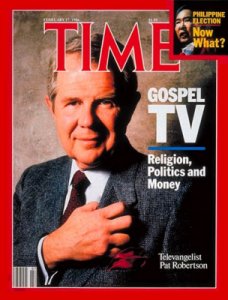
Pat Robertson's High Horse
by Cal Thomas
Religious broadcaster Pat Robertson, who's spent a considerable number of years on television handicapping the sins of others and prophesying their destruction, owns a racehorse. "I don't bet and I don't gamble," Mr. Robertson told New York Times sports reporter Bill Finley. "I just enjoy watching horses running and performing."
So far, Mr. Robertson has invested $520,000 in his horse, named "Mr. Pat," after himself. The man who once said the city of Orlando would be attacked by killer tornados because Disney World held a "gay day" also bred one of his mares to a horse whose stud fee is $125,000, the reporter found.
This reminds me of the warning about sin's slippery slope delivered by professor Harold Hill to the people of River City in the Broadway musical, "The Music Man": "The next thing you know your son is playin' for money in a pinchback suit; and listenin' to some big out-o'-town jasper here him tell about horse race gamblin'; not a wholesome trottin' race, no, but a race where they set down right on the horse.
Like to see some stuck-up jockey boy sittin' on Dan Patch? Make your blood boil, well, I should say." Hill was a con man. Mr. Robertson is trying to have it both ways, which is a familiar practice among some religious leaders of different denominations. "I wish horse racing was not supported by gambling," he told the New York Times. "They call it the sport of kings.
People from King Solomon on have been raising and racing horses. The people I see at the track, they don't seem to love horses. They're looking at the Racing Form and are trying to make money betting. I like to look at them as performers and to study their bloodlines. That's what I find interesting."
It is shocking, shocking, to learn that most other people go to the track to gamble. Who knew? All that praying turns out to have been for a horse to win, place or show. "The whole culture of horse racing involves gambling, and all the money comes from people trying to hit it big gambling," University of Chicago theologian Martin Marty told Mr. Finley. Rationalization is not new, in religious or secular life. We want approval for the things we do, even when they don't look good to others.
But using Mr. Robertson's rationalization, a visit to a bordello could be justified because he might testify to his appreciation of the piano's player's prowess or his desire to study the "bloodlines" of the well-proportioned staff. Speaking of King Solomon, God did have something to say about horses, though in a different context, to that ancient wise man: "The king, moreover, must not acquire great numbers of horses for himself, or make the people return to Egypt to get more of them." (Deuteronomy 17:16).
Some in evangelical Christian circles go to great lengths to avoid even the appearance of sin. The more fundamental among them believe that to be seen in certain places, such as bars or establishments where gambling takes place, hurts their "witness" to nonbelievers. Actually, Jesus hung out with many of the despised and rejected, which scandalized the hypocritical religious leaders of His day.
The difference was that while He ate dinner at their homes, He didn't behave as they did. "The notion of an evangelical entering horse racing and gambling, well, [Mr. Robertson] can pretend all he wants that he's in it for the beauty of the sport, but you can't look at it that way or buy your way out of it by saying that," Martin Marty commented to Mr. Finley.
"Mr. Pat" has yet to run a race. The thoroughbred is reported to be in less than perfect health, but that shouldn't be a problem for Mr. Pat, the broadcaster. Mr. Robertson is regularly seen "healing" people on his TV program. Maybe he can call on God to heal his horse. While that would be something worth seeing, don't bet on it.
April 29, 2002 Cal Thomas is a nationally syndicated columnist
- Pat Robertson Introduction Page
- Pat Robertson Still Silly and Overblown by the Press
- Atheist Sues ACS claiming wrongful termination
- CitiGroup settles religious discrimination lawsuit
- Bakker: Asteroid will make Y2K look like Sunday picnic
- No casualties? White House disputes Robertson comment
- Pat's Big Lie
- Coalition Survival Questioned
- Racism at the Christian Coalition
- Experts Divided over Muslim Attacks' Impact on Religion
- Pat's Diamond Scam
- Pat Robertson Warns Dover Pa of Disaster
- Pat Robertson Attacks Hindus
- Pat Robertson Loses It in Attack on High Court
- How Pat Robertson - Virginia GOP Use Each Other
- Ten Years after Oklahoma City Bombing, Nothing
- Palast investigates Pat Robertson
- Pat Robertson - God tells me it's Bush in a blowout
- The Terrorist and the Televangelist: Charles Taylor and Pat Robertson
- Pat Robertson's High Horse
- Pat Robertson Describes Islam as Violent Religion
- Pat Robertson's Big Lie in Michigan
- Pat Robertson Nuke the State Department
- Robertson's Fierce Rhetoric Hurts His Political Clout
- Controversy at Calvary Chapel
- Premillennialism and John Nelson Darby
- Comments From a Former Fundamentalist
- East Tennessee Strip Bar Wars
- Challenge to Atheists 1
- Challenge to Atheists 2
- Challenge to Atheists 3
- Challenge to Atheists 4
- Challenge to Atheists 5
- Original Sin an Overview
- Gnosticism as Explained by Bishop N. T. Wright
- Deist Critique of the Gospel of Mark
- Religious Syncretism and Christianity
- Classical Deist' View of Religion and Its Application Today
- Taking a Closer Look at Gnosticism and Christianity
- Thoughts on Theistic Evolution and Deism by Lewis Loflin
- My Answer to a Secular Fundamentalist by Lewis Loflin